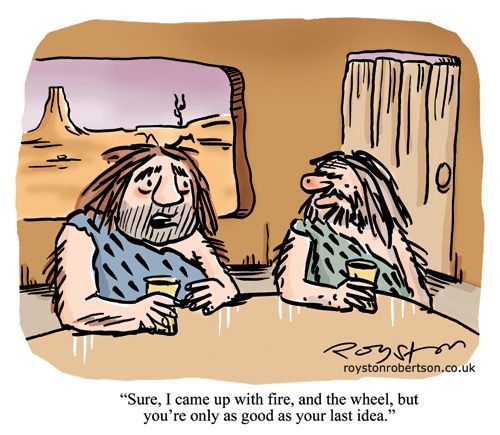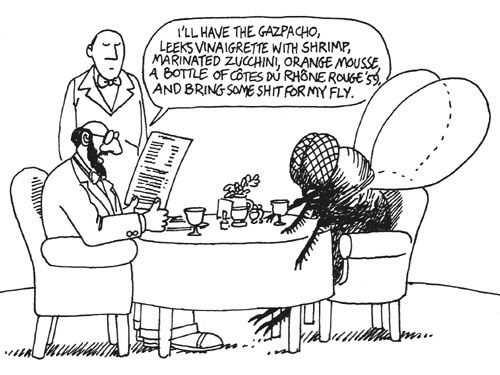This month's cartoonist is Royston Robertson
Royston's cartoon (above) appears on page 38 of our March issue. A selection of his cartoons for Prospect will be published here over the next month.
Website: www.roystonrobertson.co.uk Blog: roystonrobertson.blogspot.com
First, give me your autobiography in 100 words or so I’m a former journalist and used to draw cartoons in my spare time. I gave up a job as a sub-editor at The Times to become a full-time freelance cartoonist. My school careers teacher would probably hold his head in his hands if he knew that, but it was a question of doing what I wanted to do.
I know it’s a terrible question to ask a creative person, but where do you get your ideas from? It is a much-heard question, which is why I usually answer with something flippant, like “Belgium”. The truth is that there are many different ways: occasionally ideas pop into your head, sometimes they come from observation, but mostly it’s sitting with a sketchbook and doing what can best be described as a kind of constructive mind wandering.
How do you work – alone, hunched over a drawing board? On computer? Nine to five? I work in a converted attic in a seaside town, trying to block out the noise of seagulls screeching and fighting mere feet away on the roof. I still draw my cartoons on paper because I like the line I get with brush pens, but I scan the artwork in and do the colouring-in on a computer. As for nine to five, I’m afraid that like most cartoonists I never really switch off.
How do you cope with the rejections that accompany cartooning? I’ve got a Truman Capote quote on a Post-It note which says “Failure is the condiment that gives success its flavour.” I look at it, mutter “Ah, shut up, Truman”, then go and sulk in a corner.
Do you ever laugh at your own cartoons? I’ve been known to. Not the “Oh, my aching sides” kind of laughter, but more of a chuckle when you realise you’ve created a joke that works.
What other cartoonists have influenced you, or do you most admire? The cartoonist that really made me want to get into drawing single-panel cartoons was Gary Larson, of The Far Side fame, but I don’t actually look at his stuff much now, probably due to over-familiarity. These days, the people I most admire are my contemporaries. Despite the fact that fewer magazines use cartoons, there are still plenty of superb cartoonists out there. I’m not going to name them all here though, or this will become a very long article. Many of them grace the pages of Prospect.
Out of all the cartoons you’ve ever drawn, do you have a favourite? Probably the one with cavemen in a bar, where one says: “Sure, I came up with fire, and the wheel, but you’re only as good as your last idea.” This pretty much sums up being a cartoonist.

What cartoon do you wish you had drawn? I've always loved the fly in a restaurant cartoon by Bernard Kliban. I had a version that I copied myself on my wall at college. It's from a book of cartoons called Never Eat Anything Bigger Than Your Head.

Have you ever regretted having a cartoon published? Any complaints? As a callow youth, I did a strip that appeared in a university rag mag and attracted a lot of complaints. It imagined Jesus as a Whizzer & Chips style comic character who uses his miraculous skills to help people solve trivial, everyday problems. The Christian Society and the College Chaplain were not happy. The latter compared me to the Nazis using cartoons to mock Jews. Ouch! My cartoons have been remarkably uncontroversial over more recent years so I’ve had few complaints.
How has the profession changed since you started? Punch magazine was still around when I started. When that went it was a major loss for cartoonists. There are fewer markets for joke cartoons now. There are opportunities online, of course, but like most people cartoonists are still trying to work out how to make the internet pay.
What would you change about the profession if you could? Cartoonists would be revered, and people would throw rose petals in front of us as we walk down the street. Failing that, I’d like it to be a better paid, less precarious profession.
Do you think the internet has been good or bad for cartoonists? Both. It’s a great way to get your cartoons seen all over the world and allows people to get in touch to offer you work. But they can also get in touch with thousands of other cartoonists, many of whom are part-time and offer their services for ridiculously low fees.
What advice would you give a cartoonist starting out today? Keep calm and carry on drawing.
If you weren’t a cartoonist, what would you be doing? I’d probably still be working as a newspaper sub-editor. It was a job I enjoyed, but I find cartooning more personally rewarding.
The main occupational hazards in journalism are alcoholism and RSI. What are the risks for cartoonists? Alcoholism and RSI. And going a bit crazy by working on your own all day thinking up jokes.
What do people tend to say when you tell them you’re a cartoonist? It’s either “Really? Have I heard of you?” or “Really? I’ve got an idea you can use …”
What do cartoonists talk about when they meet up? Usually shrinking markets, I’m afraid. But we also try to do something about it and a few years ago formed the Professional Cartoonists’ Organisation to try to promote quality cartoon art.
What’s the best thing about being a cartoonist? You never know what’s going to crop up. Yesterday I was working on a commission that involved me drawing astronauts and space travel, the day before that it was dinosaurs. It’s a fun job.













